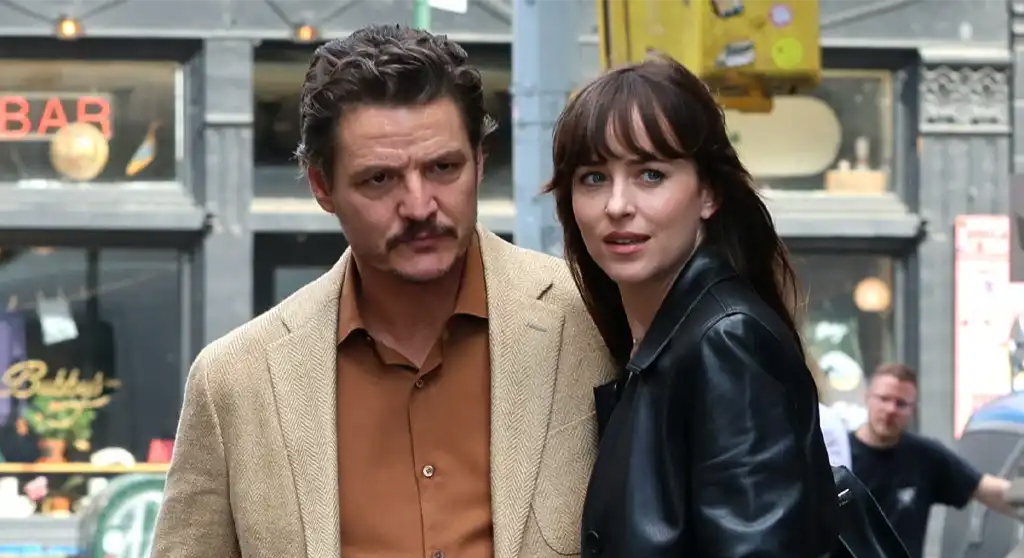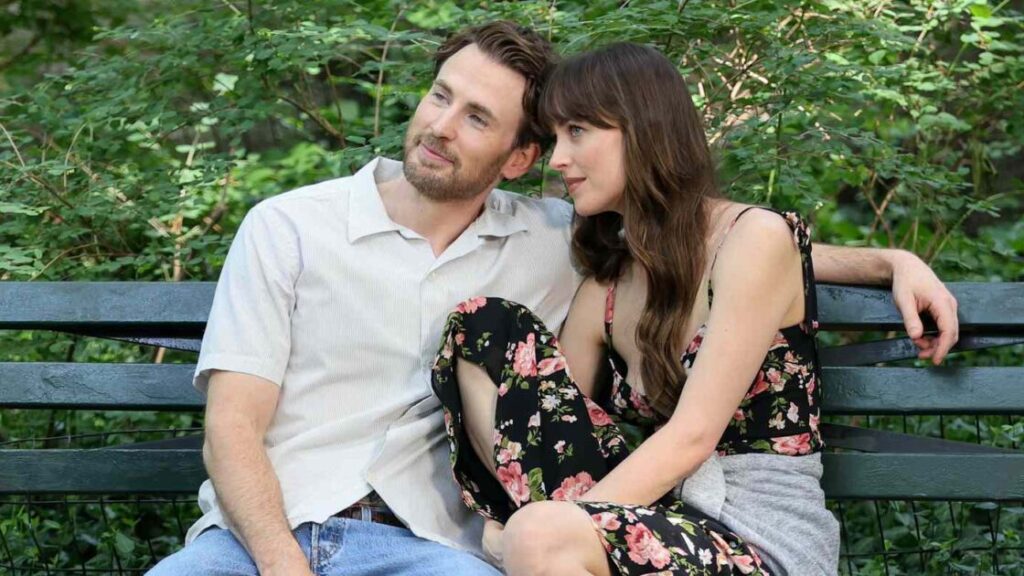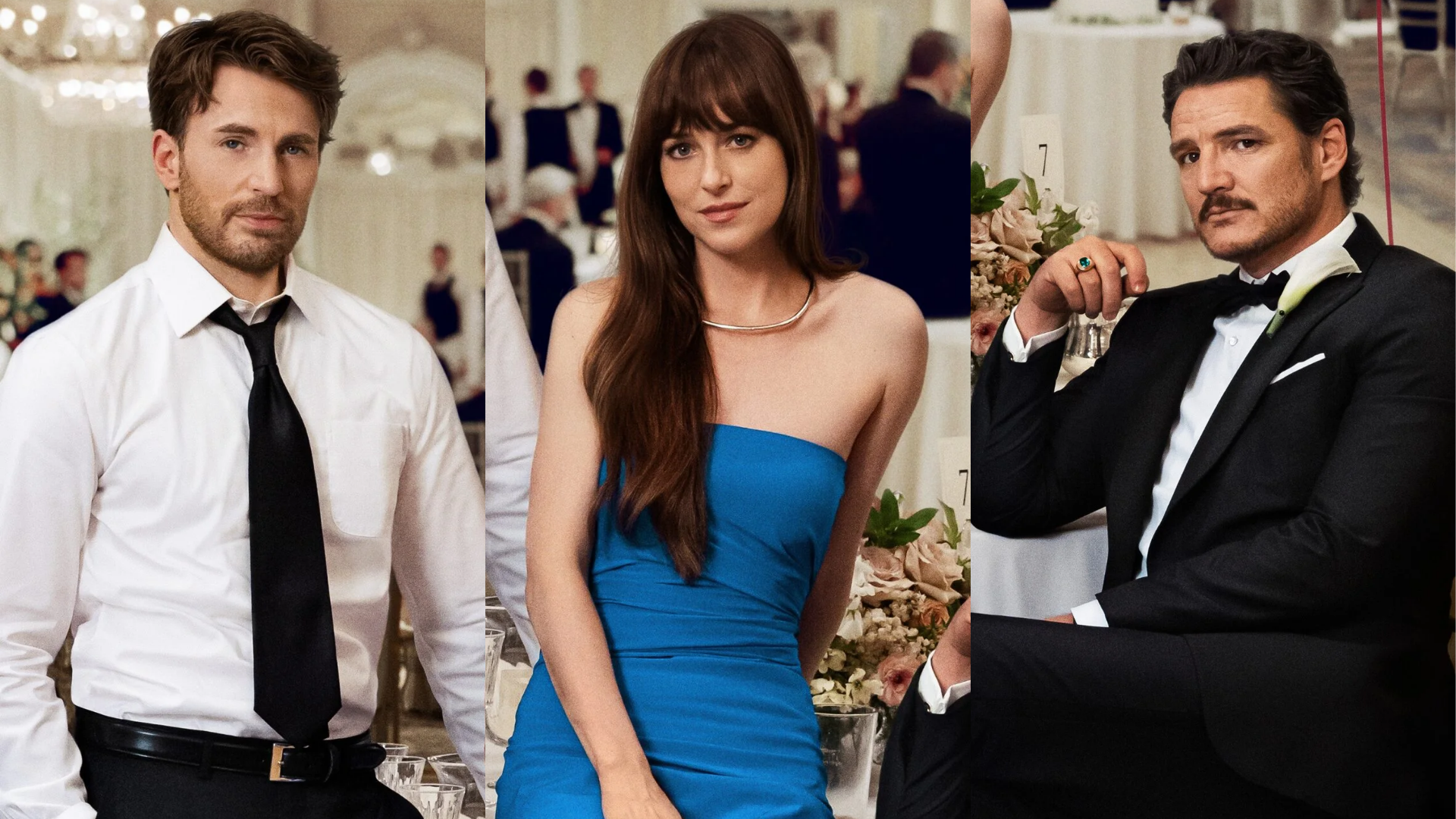It is a truth universally acknowledged, that a single man in possession of a good fortune, must be in want of a wife. Similarly, it is a truth universally acknowledged that a single woman will be happiest if she marries a man with a good fortune, similar upbringing, matching attractiveness levels, and compatible politics. At least, that’s what Materialists’ main character would have you believe.
Lucy, played by Dakota Johnson, is a matchmaker working for Adore, a New York City agency designed to set you up on dates and (hopefully) find the person you intend to marry. For Lucy and her coworkers, marriage is not about finding true love but checking off as many boxes as possible in a quest to be compatible. It’s a business agreement at the end of the day, and it turns out that’s something most of their clients can buy into.
For Lucy’s part, she believes love exists. She just doesn’t believe it will make anybody happy. She had love once with her former long-term boyfriend, John (Chris Evans). After breaking up because he was too poor, she went on dating hiatus.
She plans to marry the next person she dates, and will only date very rich people from here on out. Her wish appears to come to fruition when she meets Harry Castillo (Pedro Pascal), a man so hot, tall, and rich that in the business they call him a “Unicorn”.

Cinematography
Despite being marketed as a mid-budget romantic comedy, filmmaker Celine Song did not shy away from the long cuts and silent pauses that granted her 2023 film, Past Lives, Oscar nominations for Best Original Screenplay and Best Picture.
My theater laughed aloud at multiple moments, but the film wasn’t necessarily funny. The tone can best be captured in the opening sequence featuring two cavemen falling in love, a scene so slow and silent that the people next to me questioned whether they’d walked into the wrong movie.
The pauses and generally detached atmosphere of the film worked well with Lucy’s overall demeanor and added to my personal enjoyment of the film. It is not, however, a romantic comedy in the traditional sense of the word, and people expecting that will be disappointed on both a visual and emotional level.
Sexual Assault as a Plot Device
The following section will discuss sexual assault and have spoilers for the film. Materialists does have a character who is sexually assaulted off-screen and this is a major turning point.
There is a long history of male writers using a woman’s rape or harm as a plot device to advance the male character’s emotional arc. Game of Thrones made liberal use of this tactic during its eight year run. The superhero world used the trope so often that female comic writer Gail Simone invented the term “fridging” to describe this very thing.
That’s why it is so disappointing to see Materialists use this trope to achieve nearly the same ends. In the movie, one of Lucy’s clients, Sophie (Zoe Winters), is sexually assaulted on a date that Lucy arranged. Lucy is understandably devastated to find out what happened, and this acts as an inflection point in both the film and Lucy’s personal growth.
Had Sophie not been assaulted, Lucy would have gone ahead with her current plan of marrying a rich man who checked her boxes. However, she’s so rattled by the incident that she grows as a person and becomes less shallow as a result. When it appears that she is stalling out in her growth, Sophie once again “comes to the rescue” by calling Lucy and sharing that she’s being stalked by the same man.
Sophie, for her part, is a one-dimensional character that exists solely for Lucy’s personal growth. The two are not even friends, yet she conveniently calls Lucy when she is in trouble. She has no backstory, no other character arc, nothing that would indicate she is a real human being. Instead, she is a vessel on which harm is bestowed in order to facilitate Lucy’s ultimate happiness.
Despite Song being a female writer and Lucy being a female character, the execution of the trope and the way it hollows out another female character for the sake of another make it just as harmful as its male-centric predecessors.

Female Friendship
Perhaps my complaints above would have been less founded if there were strong female friendships over the course of the film. Instead, the women portrayed have no friends whatsoever, and that clearly informs their marriage-centric worldview.
Lucy’s only friends appear to be the women she works with, and even then she never once turns to them in moments of distress. When she has no home to go back to, she shows up on the doorstep of her ex-boyfriend. Her boss and her coworkers only speak about dating and men, which is normal for work acquaintances but leaves us with no non-romantic bonds for Lucy.
A movie about dating and marriage does not need to spend time on strong friendships, but the movie struggles to find its footing in the second act given that it relies on women’s shared trauma as a basis for Lucy’s growth yet does not provide any women for her to discuss this with. The detached, unrealistic way the women in the film discuss dating only works in the “before”. By the midway point of the movie, it rings completely hollow and leaves us wanting more.
Lucy is a woman with incredibly low self-esteem who is in desperate need of therapy and someone to remind her that she is the catch in the relationship, even if she is not a fish (you will understand this if you watch the movie). While this film does star a woman, it is far from a movie about women or centering women in any meaningful capacity.
Things I Loved
Contrary to what you may think if you’ve read this far, I had a pretty good time watching this movie! I thought there were enough positive aspects that made it enjoyable and worth watching for those of you who haven’t already. In no particular order, my (spoiler free) favorite parts of the movie were:
- Lucy and Harry’s midnight conversation
- The commentary on marriage and what it takes to make people happy long-term
- Whenever Lucy was being unnecessarily mean to John because he’s poor
- The size of the flowers Harry brought Lucy
- How beautiful every set was
- Dakota Johnson’s best acting is done whenever she is sad about something. Those parts felt very real!
- Everything that felt random was eventually called back over the course of the movie. Nothing was random! The script was very tight and that’s cool.
- The background acting of the workers at Adore. They’re always having a party just through the glass windows
- The montage scenes of people who are seeking matchmaking services but have very specific types
- John’s play
Temper your expectations going into Materialists. If you enter expecting a commentary on the viability of marriage and the necessity of love cloaked in a romance led by Dakota Johnson, you’ll get exactly what you paid for and have a great time.

Comments